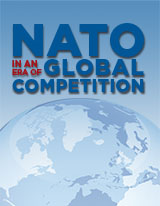The Atlantic Council’s NATO in an Era of Global Competition conference welcomed Derek Chollet, assistant secretary of defense for international security affairs at the US Department of Defense, for a luncheon conversation on the United States’ Future Role in European Security. The conversation, moderated by the Brent Scowcroft Center on International Security’s Senior Fellow Ian Brzezinski, began by applying President Obama’s recent remarks at the United States Military Academy at West Point to the current crisis in Ukraine.
Chollet shared the US government’s current relationship and experience with Ukraine’s new leadership as he discussed their current requests for support from the international community. He emphasized the current US focus on supporting Ukraine’s immediate needs for additional supplies including food for deployed troops, medical kits, and body armor. Chollet argued that, once Ukraine’s immediate needs are met, the United States will be able to help Ukraine plan for the future and meet its medium- to long-term needs.
Addressing the future of NATO, Chollet discussed continued support for NATO allies including Poland and NATO partners Azerbaijan and Georgia. He asserted that the United States will continue to support Poland as it develops its own capabilities including Poland’s missile defense system. Additionally, according to Chollet, NATO will focus its near term investments in Central Europe on developing infrastructure in the region. Both Azerbaijan and Georgia are close partners and the US will continue the current tempo of operations with both countries with a focus on increasing the relationship with Georgia.
Chollet closed by emphasizing the need for transatlantic support for US engagement in the Middle East. According to Chollet, the historic state-centric approach to dealing with threats will not work in the Middle East today and the change in the region will outlast the current administration. The only way the United States can properly engage the region, argued Chollet, is with steadfast transatlantic engagement and support.
